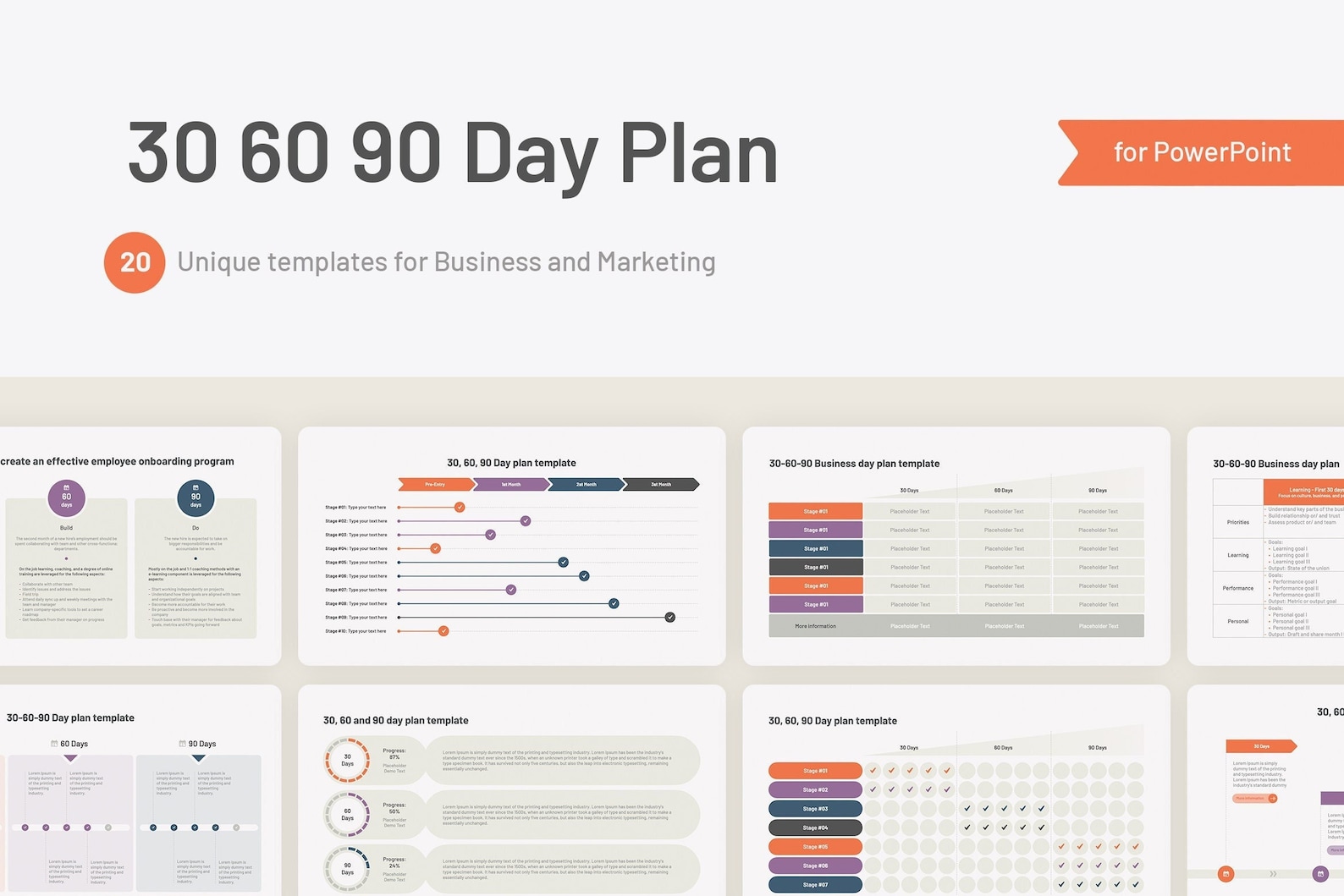In order to achieve our goals and maximize our potential, it is important to have a clear plan of action. One effective strategy for this is the 30-60-90 day plan. This plan provides a roadmap for success by breaking down goals into manageable chunks and outlining specific actions to be taken within 30, 60, and 90-day intervals. By following this plan, individuals can stay focused, track their progress, and adapt to changes along the way. In this article, we will explore the importance of the 30-60-90 day plan https://www.etsy.com/fi-en/listing/1117249630/30-60-90-day-plan-template-for and provide tips and strategies for creating and implementing one.
Understanding the 30-60-90 Day Plan: A Brief Overview
The 30-60-90 day plan is a structured approach to achieving goals within a specific timeframe. It is commonly used in business settings, particularly during the onboarding process for new employees. However, it can also be applied to personal goals and projects. The plan is divided into three phases: the first 30 days, the second 60 days, and the final 90 days.
During the first 30 days, the focus is on getting acclimated to the new environment or project and setting a solid foundation. This includes learning about the company or project, establishing relationships with colleagues or team members, and identifying key objectives to be achieved within this timeframe.
The next 60 days are dedicated to building upon the foundation established in the first phase. This involves taking on more responsibilities, implementing strategies to achieve goals, and adapting to any changes or challenges that may arise.
Finally, in the last 90 days, the focus shifts towards achieving long-term goals and maximizing potential. This phase involves taking ownership of projects or tasks, demonstrating leadership skills, and delivering results.
Setting Realistic Goals: The First Step to Maximizing Your Potential
Before diving into creating a 30-60-90 day plan, it is important to set realistic and achievable goals. Setting goals that are too ambitious or unrealistic can lead to frustration and demotivation. On the other hand, setting goals that are too easy may not push you to reach your full potential. Here are some tips for setting realistic goals:
1. Be specific: Clearly define what you want to achieve. Instead of saying "I want to improve my sales performance," specify a target such as "I want to increase my sales by 10% in the next 30 days."
2. Break it down: Divide your goals into smaller, manageable tasks. This will make them less overwhelming and easier to track progress.
3. Set deadlines: Assign deadlines to each goal or task. This will create a sense of urgency and help you stay focused.
4. Be flexible: While it is important to set specific goals, it is also important to be flexible and adapt to changes along the way. Sometimes circumstances may change, and it is necessary to adjust your goals accordingly.

Crafting a Solid 30-Day Plan: Tips and Strategies
The first 30 days of a 30-60-90 day plan are crucial for setting a solid foundation and getting acclimated to the new environment or project. Here are some tips for creating a successful 30-day plan:
1. Research and learn: Take the time to research and learn about the company, project, or industry you are working in. This will help you understand the context and make informed decisions.
2. Establish relationships: Building relationships with colleagues or team members is essential for success. Take the initiative to introduce yourself, ask questions, and seek guidance when needed.
3. Identify key objectives: Determine the key objectives that need to be achieved within the first 30 days. These objectives should align with your overall goals and contribute to the success of the project or organization.
4. Create an action plan: Break down the key objectives into specific tasks and create a detailed action plan. Assign deadlines to each task and prioritize them based on importance.
5. Seek feedback: Regularly seek feedback from your supervisor or team members. This will help you identify areas for improvement and make necessary adjustments to your plan.
The Importance of Adapting to Change: Creating a 60-Day Plan
The second phase of the 30-60-90 day plan is dedicated to building upon the foundation established in the first 30 days. This phase is crucial for adapting to changes, taking on more responsibilities, and implementing strategies to achieve goals. Here are some tips for creating a successful 60-day plan:
1. Embrace change: Change is inevitable, and it is important to embrace it rather than resist it. Be open to new ideas, approaches, and perspectives.
2. Evaluate progress: Take the time to evaluate your progress at the 60-day mark. Reflect on what has been achieved so far and identify any areas that need improvement.
3. Adjust goals if necessary: Based on your evaluation, adjust your goals if necessary. This may involve revising timelines, reallocating resources, or setting new objectives.
4. Seek opportunities for growth: Look for opportunities to expand your skills and knowledge. This could involve attending training sessions, taking on new projects, or seeking mentorship.
5. Stay focused: It is easy to lose focus or get distracted during this phase. Stay committed to your goals and remind yourself of the bigger picture.
Measuring Success: Evaluating Your Progress at the 60-Day Mark
Evaluating progress is an important part of the 30-60-90 day plan. It allows you to measure success, identify areas for improvement, and make necessary adjustments to your plan. Here are some tips for measuring success at the 60-day mark:
1. Review your goals: Review the goals you set at the beginning of the plan and assess your progress towards achieving them. Celebrate the milestones you have reached and identify any goals that still need to be worked on.
2. Seek feedback: Seek feedback from your supervisor, colleagues, or team members. This will provide valuable insights into your performance and help you identify areas for improvement.
3. Reflect on challenges and setbacks: Reflect on any challenges or setbacks you have faced during the first 60 days. Identify the lessons learned and think about how you can overcome similar obstacles in the future.
4. Adjust your plan if necessary: Based on your evaluation, make any necessary adjustments to your plan. This may involve revising goals, reallocating resources, or implementing new strategies.
5. Stay motivated: Celebrate your achievements and use them as motivation to continue working towards your goals. Stay focused and committed to your plan.
Building Momentum: Creating a 90-Day Plan to Achieve Your Goals
The final phase of the 30-60-90 day plan is dedicated to achieving long-term goals and maximizing potential. This phase involves taking ownership of projects or tasks, demonstrating leadership skills, and delivering results. Here are some tips for creating a successful 90-day plan:
1. Set ambitious but achievable goals: Set ambitious goals that push you to reach your full potential, but ensure they are still achievable within the given timeframe.
2. Break it down: Break down your long-term goals into smaller, actionable tasks. Assign deadlines to each task and prioritize them based on importance.
3. Take ownership: Take ownership of projects or tasks assigned to you. Demonstrate leadership skills by taking initiative, making decisions, and driving results.
4. Seek feedback and mentorship: Regularly seek feedback from your supervisor or mentor. This will help you identify areas for improvement and make necessary adjustments to your plan.
5. Stay accountable: Stay accountable to yourself and your goals. Track your progress, celebrate achievements, and stay motivated.
Staying Accountable: Tracking Your Progress and Staying Motivated
Staying accountable is crucial for the success of the 30-60-90 day plan. It helps you stay focused, track your progress, and make necessary adjustments to your plan. Here are some tips for staying accountable:
1. Track your progress: Regularly track your progress towards achieving your goals. This can be done through regular check-ins, progress reports, or using a tracking tool or app.
2. Celebrate achievements: Celebrate your achievements along the way. This will help you stay motivated and provide a sense of accomplishment.
3. Stay motivated: Find ways to stay motivated throughout the process. This could involve setting rewards for yourself, seeking support from others, or visualizing your success.
4. Seek support: Seek support from colleagues, friends, or family members. Share your goals with them and ask for their encouragement and accountability.
5. Reflect on setbacks: Reflect on any setbacks or challenges you have faced and think about how you can overcome them in the future. Use them as learning opportunities and motivation to keep going.
Overcoming Obstacles: Strategies for Dealing with Challenges and Setbacks
Challenges and setbacks are inevitable when working towards goals. It is important to have strategies in place to overcome these obstacles and stay focused on your plan. Here are some strategies for dealing with challenges and setbacks:
1. Stay positive: Maintain a positive mindset and believe in your ability to overcome challenges. Focus on solutions rather than dwelling on problems.
2. Seek support: Reach out to colleagues, mentors, or friends for support and guidance. They may have valuable insights or advice that can help you overcome obstacles.
3. Learn from failures: View failures as learning opportunities rather than setbacks. Reflect on what went wrong, identify lessons learned, and use them to improve your approach.
4. Stay flexible: Be open to adjusting your plan or approach when faced with unexpected challenges. Adaptability is key to overcoming obstacles and staying on track.
5. Stay focused: Stay focused on your goals and remind yourself of the bigger picture. Visualize your success and use it as motivation to keep going.
Leveraging Your Strengths: Maximizing Your Potential Through Self-Awareness
Self-awareness is crucial for maximizing your potential and achieving your goals. By understanding your strengths and weaknesses, you can leverage your strengths to overcome challenges and achieve success. Here are some tips for leveraging your strengths:
1. Identify your strengths: Take the time to identify your strengths and areas of expertise. This could be a particular skill, knowledge, or personal trait.
2. Use your strengths strategically: Once you have identified your strengths, find ways to use them strategically in your plan. This could involve taking on tasks that align with your strengths or seeking opportunities to showcase them.
3. Seek feedback: Seek feedback from others to gain a better understanding of your strengths. This will help you identify areas where you excel and areas where you can further develop.
4. Develop new skills: While it is important to leverage your strengths, it is also important to continuously develop new skills. This will help you stay competitive and adapt to changing circumstances.
5. Be self-reflective: Take the time to reflect on your performance and identify areas for improvement. Use this self-awareness to make necessary adjustments to your plan and maximize your potential.
Celebrating Success: Recognizing Achievements and Setting New Goals for Continued Growth
Celebrating success is an important part of the 30-60-90 day plan. It provides a sense of accomplishment, boosts motivation, and encourages continued growth. Here are some tips for celebrating success:
1. Acknowledge achievements: Take the time to acknowledge and celebrate your achievements along the way. This could involve rewarding yourself, sharing your success with others, or simply taking a moment to reflect on your progress.
2. Share your success: Share your success with colleagues, friends, or family members. This will not only provide a sense of pride but also inspire others to set and achieve their own goals.
3. Set new goals: Once you have achieved your initial goals, set new ones to continue your growth and development. This could involve taking on new projects, seeking new opportunities, or expanding your skills.
4. Reflect on lessons learned: Reflect on the lessons learned throughout the process. Identify what worked well and what could be improved upon in the future.
5. Stay motivated: Use your achievements as motivation to keep going. Remind yourself of what you have accomplished and the potential for even greater success in the future.
Conclusion
The 30-60-90 day plan is a powerful tool for achieving goals and maximizing potential. By breaking down goals into manageable chunks and creating a structured plan of action, individuals can stay focused, track their progress, and adapt to changes along the way. Setting realistic goals, crafting solid plans for each phase, staying accountable, and leveraging strengths are key strategies for success. By celebrating achievements and setting new goals for continued growth, individuals can maintain momentum and achieve even greater success in the future. So start creating your 30-60-90 day plan today and work towards achieving your goals!
|









